
NanoMedica, NCBiotech, WFU Go Mano a Nano
By Susan Poulos, NCBiotech Writer
 |
|
NanoMedica CEO Roger Cubicciotti (left) meets with Wake Forest University physics professors Jed Macosko, Keith Bonin and Martin Guthold. -- Photos courtesy of WFU |
Good things come in small packages.
And in the case of NanoMedica, a Winston-Salem biomedical nanotechnology company working in partnership with Wake Forest University’s (WFU) physics department, these tiny packages promise big rewards in many areas, including expedited medical diagnoses allowing for faster results, or in accelerating the drug discovery process.
"Nano" is a metric prefix referring to measurements in nanometers. One nanometer is one-billionth of a meter. The period at the end of this sentence spans about half a million nanometers.
Wanting to be geographically closer to WFU researchers, NanoMedica relocated from New Jersey to North Carolina in 2010. With assistance from the North Carolina Biotechnology Center, the company is fulfilling the promise of commercializing WFU’s game-changing innovations.
NCBiotech Grant Helps Boost Commercialization
In 2012, NCBiotech awarded a two-year, $100,000 Collaborative Funding Grant to NanoMedica and WFU to support getting their Next-Gen Lab-on-Bead technology to market. This tool uses next-generation sequencing to accelerate the drug discovery process by enabling millions of sequencing reactions to be done simultaneously. This allows researchers to quickly identify a possible drug candidate designed to treat a specific disease. In one application the DNA sequence itself serves as the drug candidate. In another, it serves as a barcode for identifying low-molecular-weight (small-molecule) drug candidates.
 |
| WFU biology graduate student Jason Gagliano in the lab |
Keith Bonin, WFU Professor and chair of physics, said NCBiotech’s CFG grant provided instrumental support for NanoMedica getting started in North Carolina by supplying funds for the WFU lab to hire Jason Gagliano, a WFU biology graduate student.
“It allowed WFU and NanoMedica team members to collaborate and generate enough preliminary data and to crystallize ideas and plans, allowing us to land a significant federal grant to support further development of our drug discovery platform,” he said. This CFG grant was augmented by $20,000 from NanoMedica and $40,000 in in-kind faculty time, totaling $160,000.
Later in 2012 the team received a $700,000 SBIR grant from the National Institutes of Health to commercialize the technology.
NCBiotech also provided a $75,000 Biotechnology Research Grant to WFU scientists in 2008 that supported early research into nano-scale “Lab-on-Bead” processing of encoded chemical libraries.
Today, thanks in significant part to the support from NCBiotech, “NanoMedica is the only company in the world that provides sequencing services where an investigator can hand over a sample, have it sequenced, and review the personalized data with the company team,” said Bonin.
Unique collaboration
Roger Cubicciotti, CEO of NanoMedica, said, “The beauty of our collaborative model, which the NCBiotech grants fostered, is that the university faculty, undergraduate students, graduate students, and the company meet as one team. Often the perception is that relationships between academia and companies face divergent goals. We recognize that the research aspect needs to be coupled with activities that generate impact to the public, and our team is able to do this very well.”
Moving forward
Members of the NanoMedica / WFU team believe that the future of genomics will be applied to drug discovery — an entirely new application. “This platform, with additional innovation adapted by pharma and biotech industry, is a much more efficient way to discover drugs,” said Bonin.
With several more NIH grant proposals in the works, NanoMedica and WFU are optimally positioned for the anticipated boom in next-generation genetic sequencing over the next five years. Next-Gen sequencing is one of the fastest growing markets in the biomedical industry, according to a 2012 report by the research firm Frost & Sullivan.
“The key is persistence,” said Bonin. “If you have a good idea and you don’t secure funding the first or second time around, sharpen your ideas, collect more data, and submit again.”
